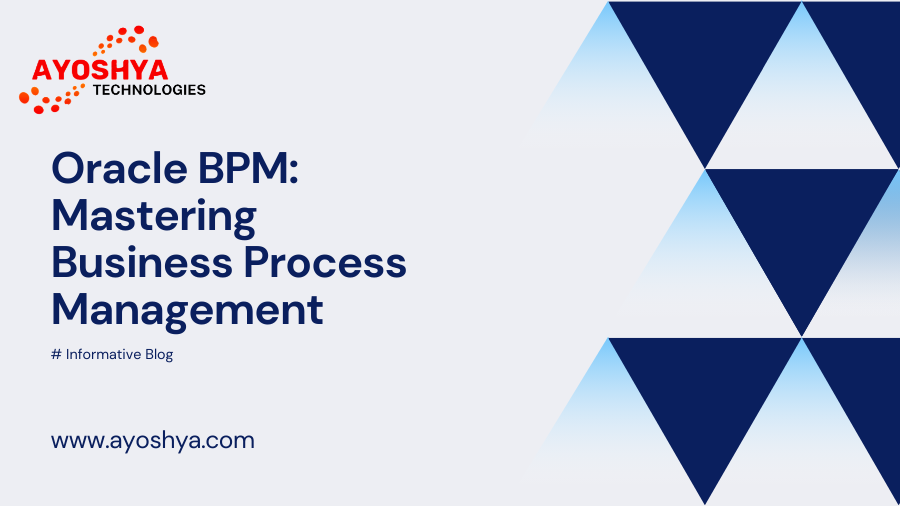Oracle BPM: Mastering Business Process Management
Business Process Management (BPM) is a critical component of modern enterprises, streamlining operations and optimizing efficiency. In the realm of BPM, Oracle BPM stands out as a powerful and versatile solution. In this comprehensive guide, we will delve into the key aspects of BPM, its functionalities, benefits, and how it can propel your business processes to new heights.
Understanding Oracle BPM
Oracle BPM, or Business Process Management, is a suite of tools and technologies designed to model, execute, and optimize business processes. It enables organizations to define, automate, and manage their business processes effectively. The primary goal of BPM is to enhance operational agility, reduce costs, and improve overall business performance.
Key Features of Oracle BPM
- Process Modeling: It provides a user-friendly interface for modeling complex business processes. With drag-and-drop functionality, organizations can visually design their workflows.
- Process Execution: Once modeled, BPM allows for the execution of these processes, ensuring that tasks are carried out efficiently and according to defined workflows.
- Real-time Analytics: Gain insights into your business processes with real-time analytics. BPM includes robust reporting and analytics tools to monitor and optimize performance continuously.
- Integration Capabilities: Seamlessly integrate BPM with other Oracle applications and third-party systems, creating a unified ecosystem for your business processes.
The Benefits of Oracle BPM
1. Improved Efficiency
BPM automates repetitive tasks, reducing the risk of errors and accelerating process execution. This results in significant time savings and improved overall efficiency.
2. Enhanced Visibility
Gain a comprehensive view of your business processes with Oracle BPM’s monitoring and analytics tools. Identify bottlenecks, track performance metrics, and make data-driven decisions.
3. Agility and Flexibility
Adapt to changing business environments with ease. BPM allows for quick modifications to processes, ensuring that your organization remains agile and responsive.
4. Cost Reduction
By automating manual tasks and streamlining processes, BPM contributes to cost reduction. Organizations can allocate resources more efficiently, leading to substantial savings.
Getting Started with Oracle BPM
1. System Requirements
Before implementing BPM, ensure that your system meets the necessary requirements. Check Oracle’s official documentation for the latest information on hardware and software prerequisites.
2. Installation and Configuration
Follow the step-by-step installation and configuration guides provided by Oracle. This ensures a smooth setup process and optimal performance of the BPM suite.
3. Process Modeling
Begin by identifying key business processes that can benefit from automation. Utilize Oracle BPM’s intuitive modeling tools to create visual representations of your workflows.
4. Testing and Optimization
Thoroughly test your BPM processes in a controlled environment. Identify areas for improvement and optimization to enhance overall efficiency.
Challenges and Solutions
1. Change Management
Implementing BPM may require organizational changes. Effective change management strategies, including training programs and communication plans, can mitigate resistance and ensure a smooth transition.
2. Integration Complexity
Integrating Oracle BPM with existing systems can be complex. Leverage Oracle’s extensive documentation and seek professional assistance to overcome integration challenges.
Conclusion
It is a game-changer for businesses seeking to optimize their processes and stay competitive in today’s dynamic landscape. By automating, monitoring, and continuously improving business processes, organizations can achieve operational excellence and drive sustainable growth.
To leverage the full potential of BPM, it is crucial to invest time in understanding its features, benefits, and best practices for implementation. Whether you are a seasoned professional or new to BPM, Oracle’s robust suite provides a scalable and efficient solution for businesses of all sizes.
FAQs
1. Is Oracle BPM suitable for small businesses?
Yes, BPM is scalable and can be adapted for small to large enterprises, making it suitable for businesses of all sizes.
2. How often does Oracle update its BPM suite?
Oracle regularly releases updates and patches to enhance the functionality and security of the BPM suite. Stay informed through Oracle’s official channels for the latest updates.
3. Can BPM integrate with non-Oracle systems?
Absolutely. BPM provides robust integration capabilities, allowing seamless connectivity with both Oracle and non-Oracle systems.
4. Is training available for BPM implementation?
Yes, Oracle offers comprehensive training programs and documentation to assist organizations in successfully implementing BPM.
5. Are there any industry-specific templates available in BPM?
Yes, Oracle provides industry-specific templates to expedite the process modeling and implementation for various business domains.
You might be interested in:
SAP As The Central Component Of Digital Transformation
Oracle Integration Cloud: Bridging the Digital Divide



